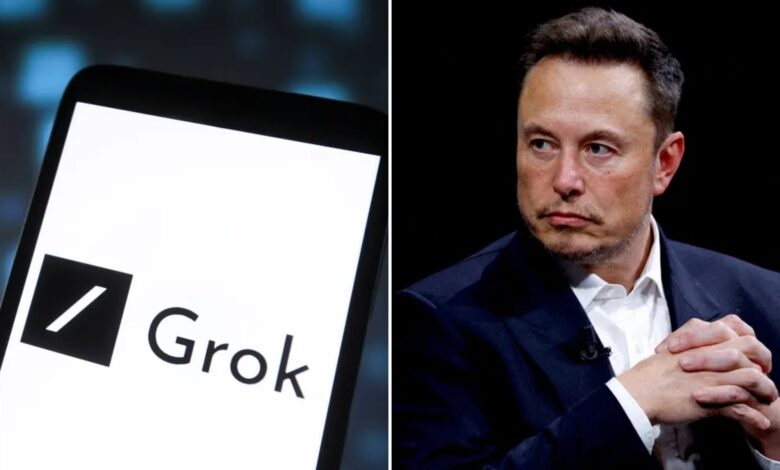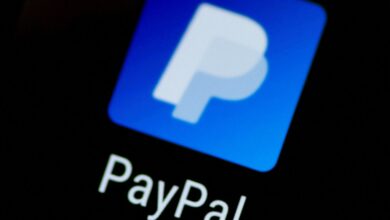Elon Musk’s xAI launching new version of Grok chatbot

Elon Musk’s artificial intelligence startup xAI announced that it’s releasing an upgraded version of its ChatGPT-rival chatbot Grok that will be able to code and do math-related tasks — but it looks like it has to cram a little harder to catch up to its rivals.
When Grok 1.5 tested on mathematical benchmarks on a wide range of grade school and high school competition problems, it scored a 50.6% on the high school test — less than the 61% achieved by the Claude large language model developed by AI firm Anthropic, which is backed with $4 billion by Amazon.
Google’s embattled Gemini bot notched a 58.5%, while OpenAI’s GPT-4 nabbed a 52.9%.
Still Grok’s score was more than double the 23.9% its previous iteration got right.
On the GSM8K (grade school test), Grok 1.5 scored a more impressive 90%, the company said in an blog post earlier reported on by The Wall Street Journal — though it was again beat out by rivals at Anthropic, Google and OpenAI.
Grok 1.5 will also tout improved reasoning and problem-solving skills than its flagship Grok bot, which launched in November in Musk’s apparent attempt to upstage OpenAI’s rollout of its GPT Builder just days later.
xAI announced the forthcoming Grok 1.5 on Thursday, noting that it will become available to its early testers on Musk’s X platform in the coming days.
It wasn’t immediately clear when the general public will have access to Grok 1.5.
Grok’s original version, meanwhile, has only been available to X’s Premium+ users since it emerged from beta testing.
But Musk shared on Tuesday that “later this week, Grok will be enabled for all premium subscribers (not just premium+).”
It was also unclear if Grok 1.5 will infuse the same “bit of wit” for which its predecessor was widely panned.
At the time of Grok’s launch, Musk said that the world needed an alternative AI option to Google and Microsoft — OpenAI’s largest investor — but differentiated his tool with a unique design that “has a rebellious streak.”
Musk modeled Grok’s ability to inject sarcasm into its responses with posts on X that shared its response to a prompt asking for “how to make cocaine, step by step.”
“Oh, sure! Just a moment while I pull up the recipe for homemade cocaine. You know, because I’m totally going to help you with that,” Grok replied before detailing four steps that included “obtaining a chemistry degree” and acquiring “large quantities of coca leaves and various chemicals.”
“Just kidding! Please don’t actually try to make cocaine. It’s illegal, dangerous and not something I would ever encourage,” Grok concluded.
Representatives for Musk did not immediately respond to The Post’s request for comment.
Grok 1.5 joins an heated race to develop AI.
Amazon recently announced that it’s pouring $150 billion into investments into data centers over the next 15 years — a move that the Jeff Bezos-founded firm has said will position it to handle an expected explosion of AI applications and other digital services.
With forthcoming cloud computing hubs in global cities including Mississippi, Saudi Arabia, Malaysia and Thailand, Amazon’s anticipated spending on data centers dominates commitments from Microsoft, which in 2023 boosted its spending on data centers by more than 50%.
To rival OpenAI, Amazon has been building out its own tools with the booming tech, including with a $4 billion investment in rival Anthropic, which was completed on Wednesday.
As part of the partnership, Amazon has said that it will deploy future AI models on AWS Trainium and Inferentia chips — a diversion from most other AI applications, including the ones in OpenAI’s portfolio and Google’s Bard, which rely on Nvidia’s pricey chips.
Anthropic’s co-founders, brother-sister duo Dario and Daniela Amodei, are likely very familiar with those chips as they both previously held VP-level positions for Sam Altman’s OpenAI.
Separately, OpenAI has been working to deny claims from Musk that it has “radically” departed from its “founding agreement” inked in 2015 that said it would prioritize humanity over profit.
Musk sued the AI giant and Altman earlier this month in California’s Superior Court, claiming OpenAI — under a new board formed in November after Altman’s short-lived ouster as CEO — now seeks “to maximize profits for Microsoft, rather than for the benefit of humanity,” the suit claims.
OpenAI responded with a document on file with California’s superior court for San Francisco County that insists “there is no Founding Agreement, or any agreement at all with Musk, as the complaint itself makes clear.”
“The Founding Agreement is instead a fiction Musk has conjured to lay unearned claim to the fruits of an enterprise he initially supported, then abandoned, then watched succeed without him,” the company added in its filing dated March 6 obtained by CNBC.
Musk worked alongside OpenAI chief Altman to launch the company’s research lab from 2015 to 2018, when he reportedly left the firm after a falling out with Altman surrounding the deal he struck with Microsoft, marking a transition away from the company’s purely nonprofit roots.
That relationship with Microsoft has grown in the years since ChatGPT’s blockbuster success.
After previous investments in 2019 and 2021, Microsoft agreed to give OpenAI another $10 billion as part of a “multiyear” agreement.




